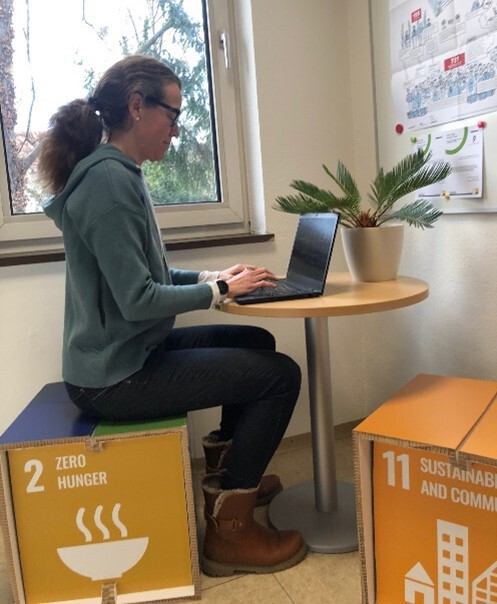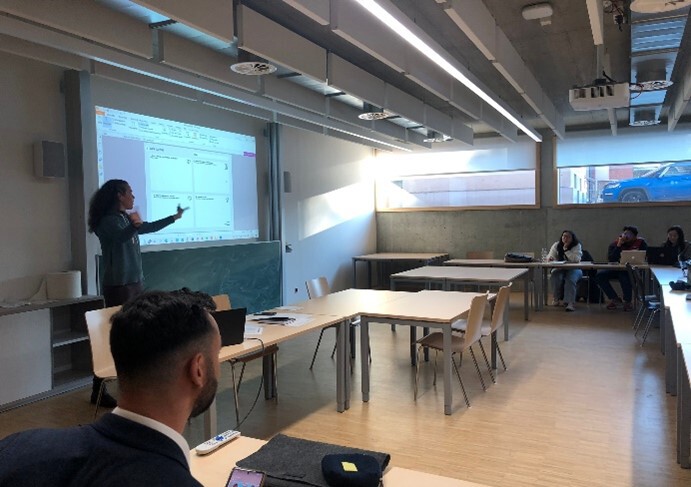/Contribution
Team update & insights about plant-based diets as a social innovation and contribution to achieve the SDGs in Spain
We present our new team member, associate researcher Fàtima Canseco López from Innova Institute at La Salle Ramon Lull University Barcelona. During her 3-month stay at our Institute for Development Research we exchange knowledge and experience in SDG-related teaching and research. Under the umbrella of the SDGs, she provided a social innovation perspective on projects, as well as a tool (Business Model Canvas) that students can use to develop and document their SDG-related projects.
In the following Fàtima will give insights about her research on the diffusion of social innovation using plant-based diets as a case study.

Source: Laura Hundscheid

Source: Andreas Bauer
Plant-based diets as a social innovation
How their diffusion process can be better understood considering the personal involvement of the individual.
Social innovation addresses social problems and aims to improve social services (European Commission, 2013). Some of the solutions proposed by social innovations are sustainable for some societal challenges such as climate change (Howaldt et al., 2015; Murray et al., 2010; Schwerk, 2015). Indeed, the protein transition promoted by the United Nations and the Food and Agriculture Organisation of the United Nations can contribute to achieving some of the Sustainable Development Goals (SDGs), such as “Zero Hunger” or “Climate Action” (Martin and Brandão, 2017; UN, 2012).
Spain has about 47.6 million inhabitants (INE, 2022) of which 9.9% follow some kind of plant-based diet (vegan, vegetarian or flexitarian). Within this group, 15% are young people between 18 and 24 years of age (Lantern, 2019), i.e. they belong to the Gen Z. Generations Y and Z are more likely to consume plant-based foods (Lantern, 2019; The Food Institute, 2020) and specifically, Gen Z is the most interested in them (FONA International, 2019). For Gen Y, wellness is a key element in their daily lives and plant-based diets have an established penetration in this age range (Lantern, 2019). But it is noted that the conversion from trial to repetition remains low; therefore, trying plant-based diets is no guarantee of adoption (Lantern, 2019).
Spain is the country with the highest red meat consumption in Europe. The Spanish Agency for Food Safety and Nutrition (AESAN) recommends that Spanish individuals limit meat consumption to a maximum of three servings per week in their new guidelines (AESAN, 2022). Adopting these recommendations can contribute both to improving the health and well-being of individuals and to reducing the environmental impact of the food system (AESAN, 2022; ProVeg, 2023). Therefore, these guidelines have been developed both from the point of view of healthy and environmentally sustainable diets, always in line with the SDGs.
But why are not such diets more widespread in society? In our research, we found that social norms (traditions and even the dietary education received from parents) can be a barrier to their adoption. Moreover, at the individual level, if the potential adopter does not dare to experiment and step out of their comfort zone or he or she experiences some kind of internal disharmony (cognitive dissonance), these psychological states may prevent him or her from adopting a plant-based diet even if there are previous adopters in their close social network.
Literature:
AESAN (2022). [ONLINE] Available at: https://www.aesan.gob.es/AECOSAN/web/nutricion/campanyas/come_bien.htm (Accessed 16 January 2023)
European Commission. (2013). [ONLINE] Available at: https://op.europa.eu/en/publication-detail/-/publication/86b50f05-2b71-47d3-8db3-4110002b0ccb%20 (accessed 10 January 2023).
FONA International. 2019. [ONLINE] Available at : https://www.fona.com/articles/2019/04/plantbased-seeds-of-change-part-2-plantbased-eating-as-a-permanent-shift (accessed 25 July 2022).
Howaldt, J., Kopp, R., & Schwarz, M. (2015). Social innovations as drivers of social change—Exploring Tarde’s contribution to social innovation theory building. In New frontiers in social innovation research (pp. 29-51). Palgrave Macmillan, London.
INE (2023). [ONLINE] Available at : https://www.ine.es/dyngs/INEbase/es/operacion.htm?c=Estadistica_C&cid=1254736176951&menu=ultiDatos&idp=1254735572981 (accessed 16 January 2023).
Lantern. (2019). The Green Revolution: Entendiendo la expansión de la ola “veggie”. Lantern Papers.
Martin, M., &Brandão, M. (2017). Evaluating the environmental consequences of Swedish food consumption and dietary choices. Sustainability, 9(12), 2227.
Murray, R., Caulier-Grice, J., &Mulgan, G. (2010). The open book of social innovation (Vol. 24). London: Nesta.
ProVeg. (2022). [ONLINE] Available at: https://proveg.com/press-release/spain-recommends-max-3-portions-of-meat-per-week-in-new-guidance/ (accessed 16 January 2023).
Schwerk, A. (2015). Strategische Einbettung von CSR in das Unternehmen. In Corporate Social Responsibility (pp. 519-542). Springer Gabler, Berlin, Heidelberg.
The Food Institute. (2020). [ONLINE] Available at: https://foodinstitute.com/focus/gen-z-preferences/ (accessed 10 August 2022).
UN. (2012). Food security and nutrition and sustainable agriculture. [ONLINE] Available at: https://sdgs.un.org/topics/food-security-and-nutrition-and-sustainable-agriculture (accessed 5 January 2023).
